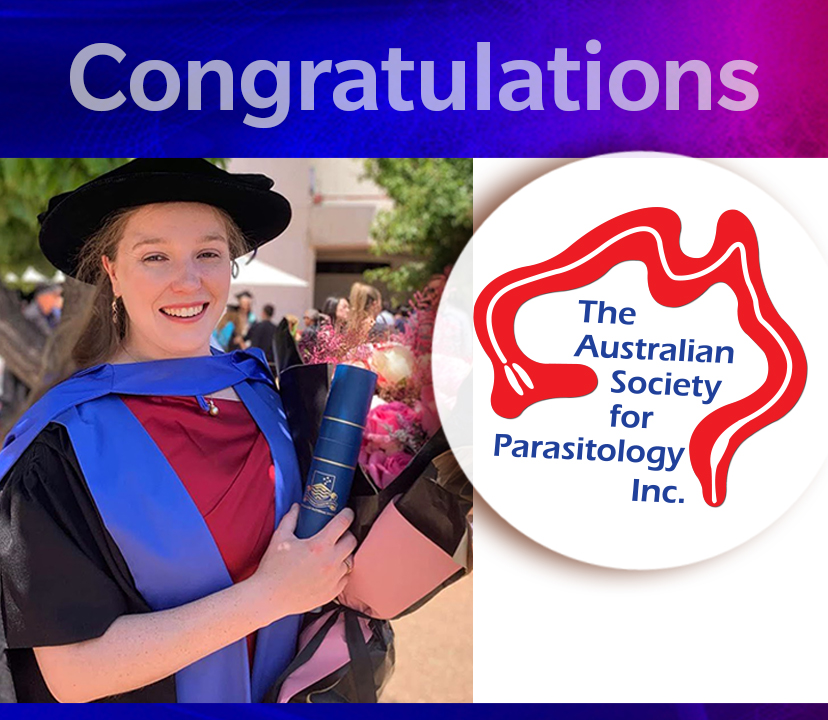Congratulations to recently graduated PhD student Kathryn Parker for winning the 2020 John Frederick Adrian Sprent Prize.
Apicomplexans rely on plasma membrane-localised transporter proteins to take up essential nutrients from their host. Although nutrient uptake is essential for parasite proliferation and virulence, the transporter proteins that mediate the uptake of many essential nutrients, including amino acids, are unknown. Kathryn’s PhD project built on work that Kathryn commenced in her Honours thesis to examine a family of predicted solute transporters that were, at the time, of unknown function. The work of Kathryn and others in our group determined that this transporter family mediate the uptake of a range of amino acids from the host, and we now term these the Apicomplexan-specific Amino acid Transporter (ApiAT) family.
In the first experimental chapter of her thesis, Kathryn examined the evolutionary relationships amongst ApiAT proteins. She demonstrated that the family is restricted to apicomplexan parasites, and that members of the family are split into a range of subfamilies. In the second experimental chapter, Kathryn went on to examine the expression and subcellular localisation of the 16 ApiAT-family proteins from toxoplasma gondii, demonstrating that about half are expressed in the disease-causing tachyzoite stage of the parasite, all of which localise to the plasma membrane of the parasites. In collaboration with other members of our research team, Kathryn then demonstrated that four of the 16 ApiAT-family proteins were important for proliferation of the disease-causing stage of the parasite. The first two chapters of Kathryn’s thesis made up
part of a comprehensive study on the ApiAT protein family that was published in PLOS Pathogens this year, and on which Kathryn is a co-first author.
In the final three experimental chapters of Kathryn’s thesis, she honed in on one of the ApiAT family proteins, ApiAT2, that she had deemed to be important for tachyzoite proliferation. Using a broad range of techniques, including the generation of genetically modified parasite strains, radiolabelled amino acid uptake experiments, metabolomics, and heterologous expression of the transporter in Xenopus oocytes, Kathryn demonstrated that ApiAT2 is the major glutamine transporter in the parasite. Glutamine plays a key role in central carbon metabolism in these parasites, and Kathryn’s discoveries (although not yet published) will further our understanding glutamine utilisation in these parasites.
Overall, we believe Kathryn’s thesis makes an extremely strong contribution to the knowledge of nutrient uptake transporters in an economically important group of parasites. The thesis is well-written, and Kathryn’s examiners were effusive in their praise, as evidenced by their summary statements, which we have included below (we also attach to this nomination the examiner reports in their entirety).
Examiner 1 wrote: Overall, the thesis is of a very high standard. The general presentation is excellent, the text is a pleasure to read and the thesis presents a range of novel findings that will increase greatly our understanding of apicomplexan parasite biology. The candidate has demonstrated an impressive degree of experimental expertise and thoughtful data interpretation and, in my opinion, should now be considered an expert in their chosen field.
Examiner 2 wrote: The candidate should be congratulated for a comprehensive body of work that is set out in a well written and easy to read format. I have never read a thesis with so few typos/mistakes. Congratulations Kathryn!
Examiner 3 wrote: Overall, the thesis is very well written. The document presents a good structure and is illustrated with original striking figures and clear tables. Throughout the text, it is clear the candidate has a strong, clear and extensive understanding of her topic.
Kathryn undertook her thesis as part of a conjoint PhD/MChD (medical) degree. This required Kathryn to complete all the experimental work from her thesis in under three years. Despite these challenges, Kathryn has completed a superb, well-written thesis that breaks important new ground in the field. Kathryn is a very worthy recipient of the John Frederick Adrian Sprent Prize.








